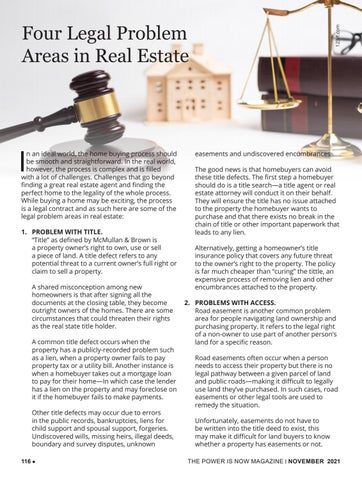I
n an ideal world, the home buying process should be smooth and straightforward. In the real world, however, the process is complex and is filled with a lot of challenges. Challenges that go beyond finding a great real estate agent and finding the perfect home to the legality of the whole process. While buying a home may be exciting, the process is a legal contract and as such here are some of the legal problem areas in real estate: 1. PROBLEM WITH TITLE. “Title” as defined by McMullan & Brown is a property owner’s right to own, use or sell a piece of land. A title defect refers to any potential threat to a current owner’s full right or claim to sell a property. A shared misconception among new homeowners is that after signing all the documents at the closing table, they become outright owners of the homes. There are some circumstances that could threaten their rights as the real state title holder. A common title defect occurs when the property has a publicly-recorded problem such as a lien, when a property owner fails to pay property tax or a utility bill. Another instance is when a homebuyer takes out a mortgage loan to pay for their home—In which case the lender has a lien on the property and may foreclose on it if the homebuyer fails to make payments. Other title defects may occur due to errors in the public records, bankruptcies, liens for child support and spousal support, forgeries. Undiscovered wills, missing heirs, illegal deeds, boundary and survey disputes, unknown 116 l
123rf.com
Four Legal Problem Areas in Real Estate
easements and undiscovered encumbrances The good news is that homebuyers can avoid these title defects. The first step a homebuyer should do is a title search—a title agent or real estate attorney will conduct it on their behalf. They will ensure the title has no issue attached to the property the homebuyer wants to purchase and that there exists no break in the chain of title or other important paperwork that leads to any lien. Alternatively, getting a homeowner’s title insurance policy that covers any future threat to the owner’s right to the property. The policy is far much cheaper than “curing” the tittle, an expensive process of removing lien and other encumbrances attached to the property. 2. PROBLEMS WITH ACCESS. Road easement is another common problem area for people navigating land ownership and purchasing property. It refers to the legal right of a non-owner to use part of another person’s land for a specific reason. Road easements often occur when a person needs to access their property but there is no legal pathway between a given parcel of land and public roads—making it difficult to legally use land they’ve purchased. In such cases, road easements or other legal tools are used to remedy the situation. Unfortunately, easements do not have to be written into the title deed to exist, this may make it difficult for land buyers to know whether a property has easements or not. THE POWER IS NOW MAGAZINE | NOVEMBER 2021




































